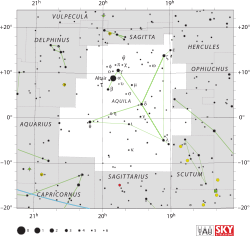Upsilon Aquilae
Upsilon Aquilae, Latinized from υ Aquilae, is the Bayer designation for a star in the equatorial constellation of Aquila. With an apparent visual magnitude of +5.91[4] it is a faint star but visible to the naked eye from suburban skies. It has an annual parallax shift of 18.65 milliarcsecond,[1] indicating a distance of around 175 light-years (54 parsecs).
 | |
| Observation data Epoch J2000 Equinox J2000 | |
|---|---|
| Constellation | Aquila |
| Right ascension | 19h 45m 39.94763s[1] |
| Declination | +07° 36′ 47.3717″[1] |
| Apparent magnitude (V) | +5.889[2] |
| Characteristics | |
| Spectral type | A3 IV[3] |
| U−B color index | +0.09[4] |
| B−V color index | +0.18[4] |
| Astrometry | |
| Radial velocity (Rv) | –29.9[5] km/s |
| Proper motion (μ) | RA: +54.10[1] mas/yr Dec.: +0.50[1] mas/yr |
| Parallax (π) | 18.65 ± 0.41[1] mas |
| Distance | 175 ± 4 ly (54 ± 1 pc) |
| Absolute magnitude (MV) | +2.24[6] |
| Details | |
| Luminosity | 10.5[6] L☉ |
| Surface gravity (log g) | 4.21[2] cgs |
| Temperature | 7,906[2] K |
| Metallicity [Fe/H] | –0.05[2] dex |
| Rotational velocity (v sin i) | 42[7] km/s |
| Other designations | |
| Database references | |
| SIMBAD | data |
Upsilon Aquilae is a subgiant star with a stellar classification of A3 IV.[3] The outer atmosphere is radiating energy into space with 10.5[6] times the Sun's luminosity at an effective temperature of 7,906 K,[2] which gives it the white-hot glow of an A-type star. It is spinning relatively quickly with a projected rotational velocity of 42 km/s.[7]
References
- van Leeuwen, F. (November 2007), "Validation of the new Hipparcos reduction", Astronomy and Astrophysics, 474 (2): 653–664, arXiv:0708.1752, Bibcode:2007A&A...474..653V, doi:10.1051/0004-6361:20078357.
- Soubiran, C.; et al. (June 2010), "The PASTEL catalogue of stellar parameters", Astronomy and Astrophysics, 515: A111, arXiv:1004.1069, Bibcode:2010A&A...515A.111S, doi:10.1051/0004-6361/201014247.
- Cowley, A.; et al. (April 1969), "A study of the bright A stars. I. A catalogue of spectral classifications", Astronomical Journal, 74: 375–406, Bibcode:1969AJ.....74..375C, doi:10.1086/110819.
- Johnson, H. L.; et al. (1966), "UBVRIJKL photometry of the bright stars", Communications of the Lunar and Planetary Laboratory, 4 (99): 99, Bibcode:1966CoLPL...4...99J.
- Wilson, Ralph Elmer (1953), "General catalogue of stellar radial velocities", Washington, Carnegie Institution of Washington: 0, Bibcode:1953GCRV..C......0W.
- Anderson, E.; Francis, Ch. (2012), "XHIP: An extended hipparcos compilation", Astronomy Letters, 38 (5): 331, arXiv:1108.4971, Bibcode:2012AstL...38..331A, doi:10.1134/S1063773712050015.
- Royer, F.; Zorec, J.; Gómez, A. E. (February 2007), "Rotational velocities of A-type stars. III. Velocity distributions", Astronomy and Astrophysics, 463 (2): 671–682, arXiv:astro-ph/0610785, Bibcode:2007A&A...463..671R, doi:10.1051/0004-6361:20065224.
- "* ups Aql". SIMBAD. Centre de données astronomiques de Strasbourg. Retrieved 2012-07-21.
External links
This article is issued from Wikipedia. The text is licensed under Creative Commons - Attribution - Sharealike. Additional terms may apply for the media files.